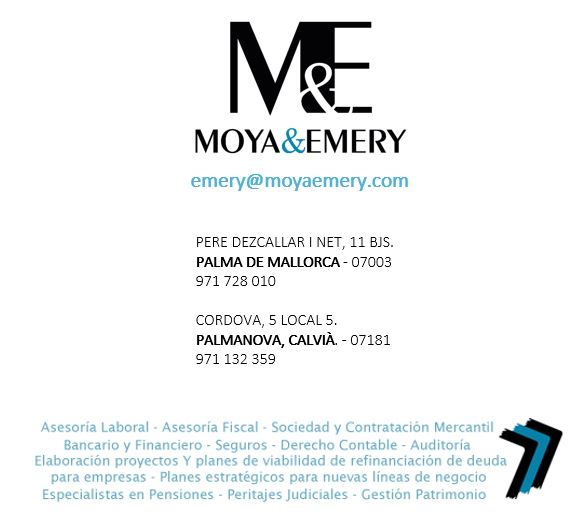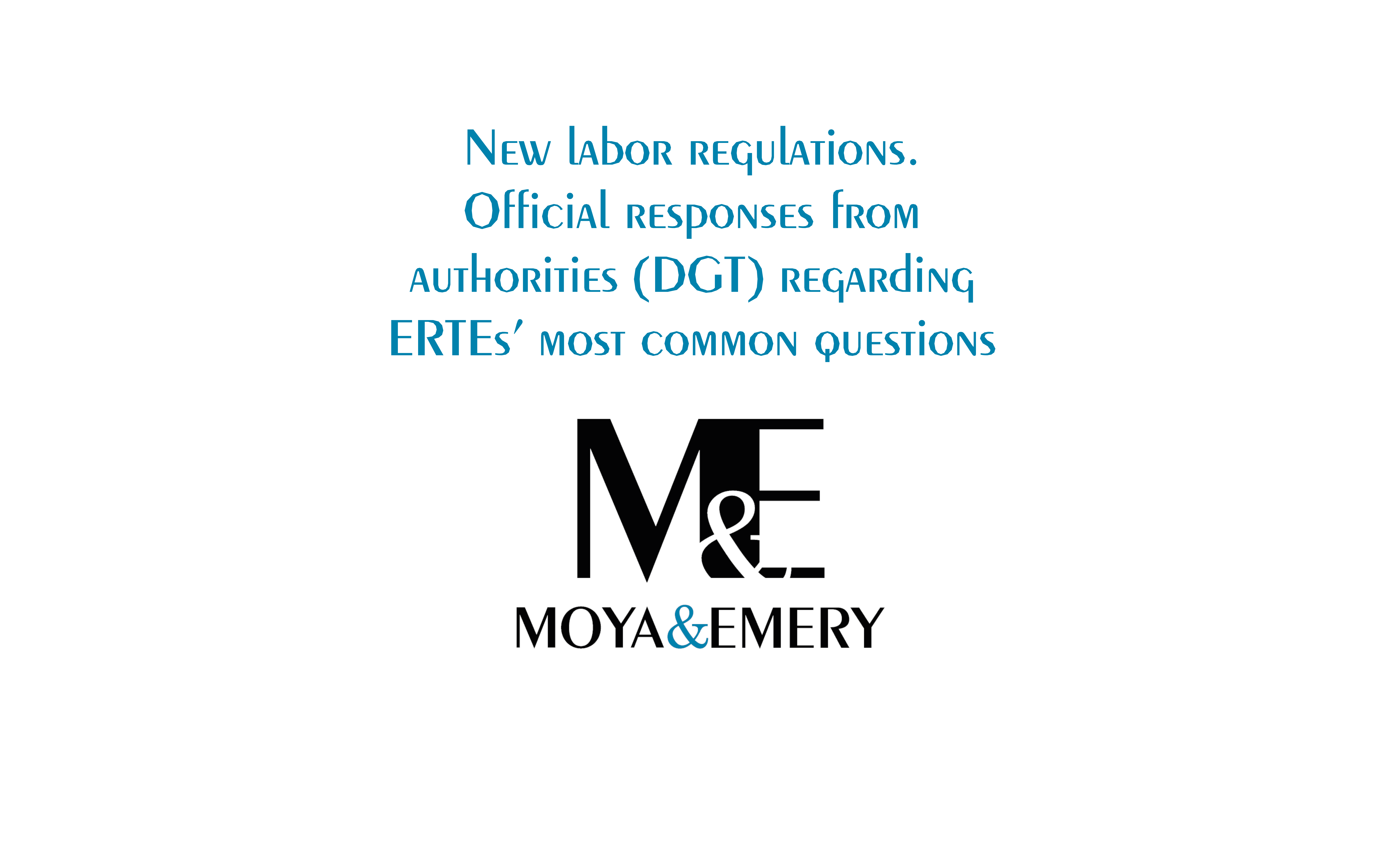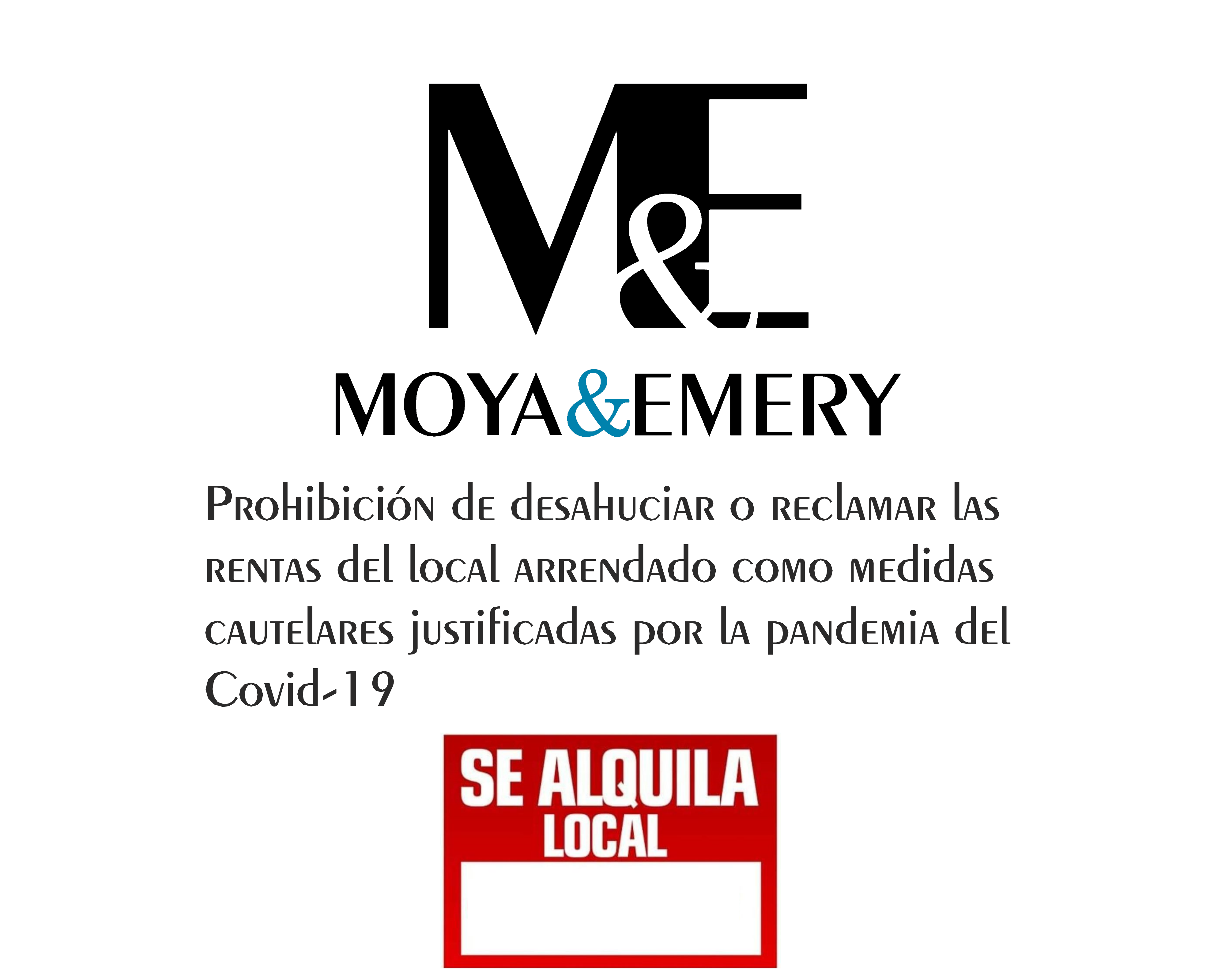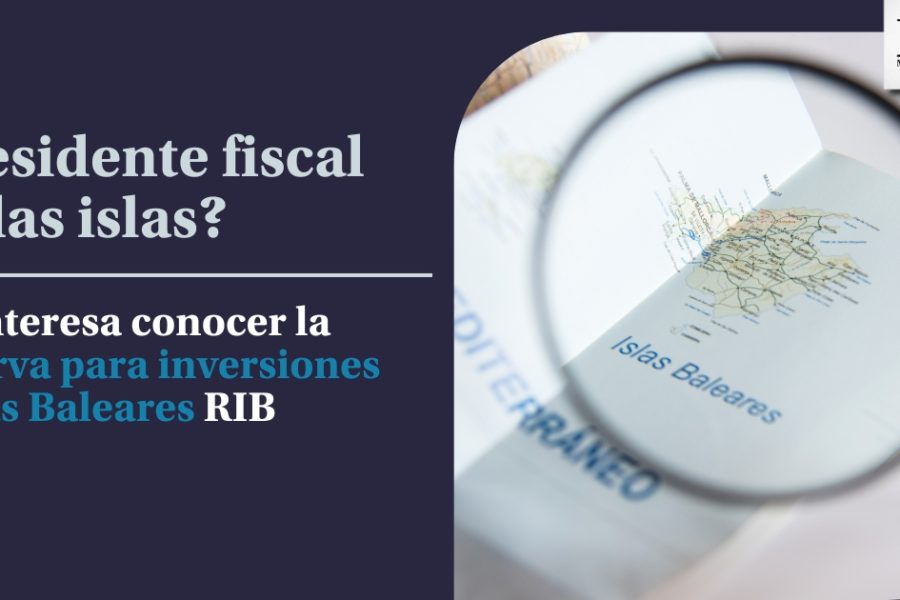There are numerous questions that generated the new labor regulations related to the remedial measures of the effects of the Covid-19 pickups, especially about ERTEs.
In front of the General Directorate of Labor -DGT-, the directive organ of the Ministry of Labor, any administrator can raise doubts about the application or scope of labor regulations. That is why that from Moya & Emery have collected some of those questions and the answers offered by the DGT setting its interpretive criteria and application guidelines.
Before the doubts planned about the interpretation of the transition from total ERTE to partial ERTE in a RESTAURANT as a consequence of the publication of RDL 18/2020, of May 27, the General Directorate of Labor has responded to the following questions (you can have access to all responses with the full text of the consultation with the DGT of 05-27-2020 , ref 726).
“1.- With the passage to Phase 1 of the de-escalation, the opening of those bars and restaurants that have a terrace or outdoor space has been allowed, allowing a maximum capacity of 50%, and guaranteeing the distance at all times of security. This means that many businesses only available with one, two or three tables L to provide the service. In this case, given the reduced number of meals that can be offered, it is not profitable for the business to open its premises in response to the new measures adopted with the publication of Royal Decree-Law 18/2020, of May 12.
a) Do these businesses have the obligation to open to the public and restart their activity, EVEN THOUGH YOU CAN ONLY OPEN A TABLE AND THAT SITUATION?
b) Can it be considered that, as the government has allowed the opening of such businesses, with the aforementioned restrictions, the cause of force majeure that founded the ERTE carried out disappears – even partially?
Both questions can be answered as follows:
The art. 1.2 of Royal Decree-Law 18/2020, of May 12, on social measures in defense of employment, establishes the following:
«2. They will be in force majeure partial derivative of the COVID-19, those companies and entities with a record of temporary employment regulation authorized based on Article 22 of Royal Decree-Law 8 / 2020 of 17 March, from moment in which the causes reflected in said precept allow the partial recovery of its activity, until June 30, 2020.
These companies and entities must reincorporate the workers affected by temporary employment regulation measures, to the extent necessary for the development of their activity, prioritizing the adjustments in terms of shorter working hours ”
In this sense, the explanatory memorandum states that “In this way, companies can recover all or part of their activity if, for the aforementioned reasons, workers return to perform their tasks fully or partially, resigning or modifying its application the unexceptional measures l is adopted at a stage of interruption of business or more rigorous confinement, with the only requirement to communicate, prior to the labor authority competent total renunciation the same, and to the Public Service of State Employment those variations that refer to the termination of the application of the measure with respect to all or part of the people affected. ”
Therefore, as deduced from this provision and as reiterated in the explanatory memorandum of said royal decree-law, companies that have a temporary employment regulation file authorized on the basis of article 22 of Royal Decree-law 8 / 2020, of March 17, will be in a situation of partial force majeure when two conditions are met:
1) that the causes described in said precept, and for which reason the different flexibility measures in the form of suspensions or reductions in working hours were applied , allow the partial recovery of its activity, until June 30, 2020 .
2) that these companies reincorporate the affected workers , to the extent necessary for the development of the activity, prioritizing the adjustments in terms of shorter working hours.
It is the responsibility of the company to assess, based on its particular circumstances, 1) at what point in time the ERTE was authorized due to force majeure, allow the partial recovery of its activity and 2) to what extent the reinstatement of the affected workers, and in what percentage of your day is necessary for the development of the activity.
«c) Can the decision not to open the business lead to the return of all the contributions of the workers that have not been paid by the exemption applicable to the ERTE due to Force Majeure?»
It is understood that companies that have ERTES due to force majeure derived from the COVID-19 authorized, will be in a situation of total or partial force majeure as long as the company does not notify the labor authority of the total resignation to ERTE. In the event that workers have not been reinstated, the company will continue in a situation of total force majeure .
On the other hand, it should be remembered that the reimbursement of contributions is linked to the obligation of commitment to employment provided in the sixth additional provision of Royal Decree-Law 8/2020, in the wording given by Royal Decree-Law 18/2020.
For more information on the cases of return of the exonerated contributions, you should contact the General Treasury of Social Security under the Ministry of Inclusion , Social Security and Migration.
«d) If no opening for being a ruinous decision, or failure to generate sufficient income to meet basic expenses, are we to understand that the fact» to open «and the ERTE passes s er part?»
«e) In that case, even if we cannot open due to being a deficit at this time, would we have to pay (with the corresponding exemption ) the social insurance of the suspended workers?»
In relation to these two questions, as has been said, only when workers are reinstated to the extent necessary for the development of the activity from the moment in which the force majeure of the authorized ERTE allows the partial recovery of the activity, the company will be in a situation of partial force majeure.
However, questions about contributions must be raised before the Secretary of State for Social Security and Pensions under the Ministry of Inclusion. Social Security and Migrations.
“2.- Since the beginning of Phase O, some businesses have been allowed to open, even partially, which is why many companies have been rescuing some of the workers included in them from the ERTE.
a) Does the Royal Decree-Law apply retroactively to these companies? If so, should the exemption percentages set out in the aforementioned Royal Decree-Law be applied from the date of reinstatement of the first worker? ”
For labor purposes, the reinstatement of a worker included in the ERTE entails the qualification of the company’s situation as «partial force majeure» , regardless of whether it had occurred before the entry into force of Royal Decree-Law 18/2020 .
But this is understood without prejudice to the effects that may arise regarding the application of Social Security regulations, about which the General Treasury of Social Security, dependent on the Ministry of Inclusion , should be consulted . Social Security and Migrations.
«3.- With regard to the exemption percentages in the contributions of workers in the cases of resignation from the partial ERTE established in article 4.2 of Royal Decree-Law 18/2020, in the event of the rescue of a worker at 50% of your working day, is it understood that I must contribute 15% of the part corresponding to the 50% of the day in which the worker is actively providing services, and 40% of the part corresponding to the remaining 50% of the day? Or only 15% of the 50% of the day? Or 15% of the total contribution base? ”
You should ask the General Treasury of Social Security under the Ministry of Inclusion. Social Security and Migrations.
«4.- In relation to article 1.3 of Royal Decree-Law 18/2020, is it only necessary to notify the Labor Authority of the renunciation of the total ERTE, or also in cases of resignation of the partial ERTE?»
In accordance with said art. 1.3, only the total resignation must be communicated to the labor authority , which establishes that “The companies and entities referred to in this article must communicate the total resignation to the labor authority. in its case, to the file of temporary regulation of authorized employment, within a period of 15 days from the date of effect of that ·.
In the same sense, the Explanatory Memorandum is pronounced by stating that not in this way, companies can recover all or part of their activity if, for the aforementioned reasons, workers return to perform their tasks fully or partially , renouncing or modifying in its application the exceptional measures that were adopted in a scenario of interruption of business activity or of greater rigor in confinement, with the only requirement to communicate. in advance. To the authority competent labor the complete surrender to them, and the Public Employment Service State variations those relating to l to completion of the implementation of the measure in respect of all or part of those affected «.
«5.- In relation to article 4.3 of Royal Decree-Law 1812020, which establishes that» for the exemption to be applicable, the communication will be made for each contribution account code «, and for the case of a company that has several businesses with different contribution account codes, can the total ERTE be maintained in one business by not starting the activity in it, and yet rescue part of the workforce in another business with a different CCC that will restart its activity? All this taking into account that everything has been processed in the same ERTE. And even more, the same company, which has a part with a terrace that can open, and one without a terrace that cannot open, can keep in the ERTE of Force Majeure the staff of the establishment that does not have a terrace (since it still cannot open in phase1)? ”
As stated, the interpretation of art. 4 of Royal Decree-Law 18/2020 corresponds to the General Treasury of Social Security under the Ministry of Inclusion. Social Security and Migrations.
«6.- In attention to the First Final Provision Three, Safeguarding employment:» 3. This commitment to maintaining employment will be valued based on the specific characteristics of the different sectors and the applicable labor regulations, taking into account, in particular, the specificities of those companies that present high variability or seasonality of employment. ”
a) How should this paragraph be interpreted? Can certain exceptions be applied to the hospitality sector as it is an activity conditioned by the variability and seasonality of employment?
b) In what terms will seasonality be taken into account? Can I communicate the end of the season to the discontinued landlines before the date that is normally communicated to them?
c) In what terms should job maintenance be calibrated ? Should the basic template to be maintained be the same as in 2019? Taking into account the records of tourism, occupation, reservation, etc.? Or can this basic template be relaxed, which must be respected?
In a hotel, where there are employees exclusively assigned to the swimming pool -for example · and the swimming pool is forbidden to open it, can these people be subject to a 100% exemption for being prohibited and continuing force majeure? Or all t orkers of the hotel, spend trading as part ERTE?
In those cases, it is not a matter of billing, occupation or workload (production), but there are parts of activity that are still prohibited and I have no legal possibility to occupy them or to rescue them from ERTE. Can I keep them 100% exonerated for continuing the ban? ”
It has already been pointed out that the companies in which the two conditions described above will meet in partial force majeure .
Questions about the sixteenth additional provision of Royal Decree-Law 8/2020 in the wording given by Royal Decree-Law 18/2020 should be asked before the General Treasury of Social Security.
3. Finally, it is recalled that the criteria set forth on the question raised is not binding, but merely informative, as the Administration lacks competence to make legal interpretations of that nature, which is exclusively attributed to the courts.
The s other responses to the query raised DGT 05/27/2020 ( ref 733), which can access the link to the document DGT 2 are as follows:
1. «Is the transition from full ERTE to partial ERTE (which therefore affects the bonuses) mandatory by type of activity?»
The art. 1.2 of the Real De creto-ley 18/2020, of May 12, on social measures in defense of employment, establishes the following:
«2. Those companies and entities that have a temporary employment regulation file authorized on the basis of article 22 of Royal Decree-Law 8/2020, of March 17, will be in a situation of partial force majeure derived from COVID-19, from the moment in which the causes reflected in said precept allow the partial recovery of its activity, until June 30, 2020.
These companies and organizations should proceed to reinstate the workers affected by measures of temporary employment regulation, to the extent necessary for the development of its activity, giving priority adjustments in terms of reduced working hours. «
In this sense, the explanatory memorandum states that “In this way, companies can recover all or part of their activity if, for the aforementioned reasons, workers return to perform their tasks fully or partially, resigning or modifying in its application the exceptional measures that were adopted in a scenario of interruption of business activity or of greater rigor in the confinement, with the only requirement of communicating, in advance, to the competent labor authority the total resignation to the same , and to the Public State Employment Service, those variations that refer to the completion of the application of the measure with respect to all or part of the people affected. ”
Therefore, as deduced from this provision and as reiterated in the explanatory memorandum of said royal decree-law, companies that have a temporary employment regulation file authorized on the basis of article 22 of Royal Decree-law 8 / 2020, of March 17, will be in a situation of partial force majeure when two conditions are met:
1) that the causes described in said precept, and for which reason the different flexibility measures in the form of suspensions or reductions in working hours were applied, allow the partial recovery of its activity, until June 30, 2020 and
2) that these companies reincorporate the affected workers, to the extent necessary for the development of the activity, prioritizing the adjustments in terms of shorter working hours.
It is the responsibility of the company to assess, based on its particular circumstances, 1) at what point in time the reasons for the ERTE being authorized by force majeure allow the partial recovery of its activity and 2) to what extent the reinstatement of the affected workers, and in what percentage of your day is necessary for the development of the activity.
2. “What happens to the companies that based on the criteria of the General Directorate of Labor (although not binding) and the statements of the Minister of Labor, dated May 1, 2020, which indicated that it was possible without problem to pass within an ERTE of Force Majeure from suspension to reduction of working hours, have they done it before May 13? ”.
For labor purposes, the reinstatement of a worker included in the ERTE entails the qualification of the company’s situation as «partial force majeure», regardless of whether it had occurred before the entry into force of Royal Decree-Law 18/2020 .
But this is understood without prejudice to the effects that may arise regarding the application of Social Security regulations, about which the General Treasury of Social Security, dependent on the Ministry of Inclusion, Social Security and Migration, should be consulted.
3. “The companies that initially requested a Force Majeure ERTE with part of the workforce with suspension of working hours and part of the workforce with reduced working hours and have not modified their activity conditions, are they considered to be still in a situation of total ERTE Or should we communicate that it is partial? ”
Companies that continue to apply the authorized measures of suspension or reduction of working hours, affect all or part of the workforce, to the extent that the causes referred to in article 22.1 of Royal Decree-Law 8 / will continue in a situation of total force majeure. 2020, prevent the restart of their activity and, in any case, until June 30, 2020.
To the extent that the two conditions described in question 1 are met, it will be considered that these companies will enter a situation of partial force majeure in accordance with art. 1.2 of Royal Decree-Law 18/2020.
4. “If an ERTE worker is recovered due to force majeure (either going from suspension to reduction or joining full time from a reduction) because it is observed that the activity may pick up, but it is subsequently observed that it does not there is some workload, can it be totally affected again in the ERTE of Force Majeure while it continues in force, provided there is justification? ”.
Yes, this will be possible until 30.6.2020 unless the company communicates the total resignation to the labor authority.
3. Finally, it is recalled that the criteria set forth on the question raised is not binding, but merely informative, as the Administration lacks competence to make legal interpretations of that nature, which is exclusively attributed to the courts.
If you want to ask us your questions or queries regarding the Temporary Employment Regulation Files -ERTE S – or any other regarding labor regulations, you can seek our advice by contacting





